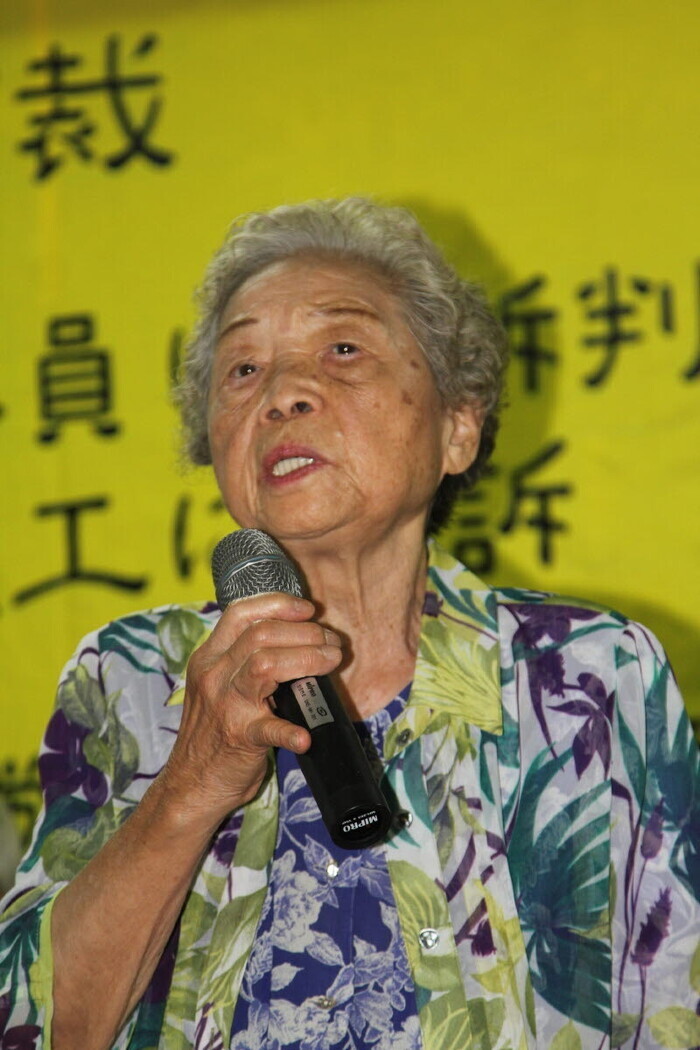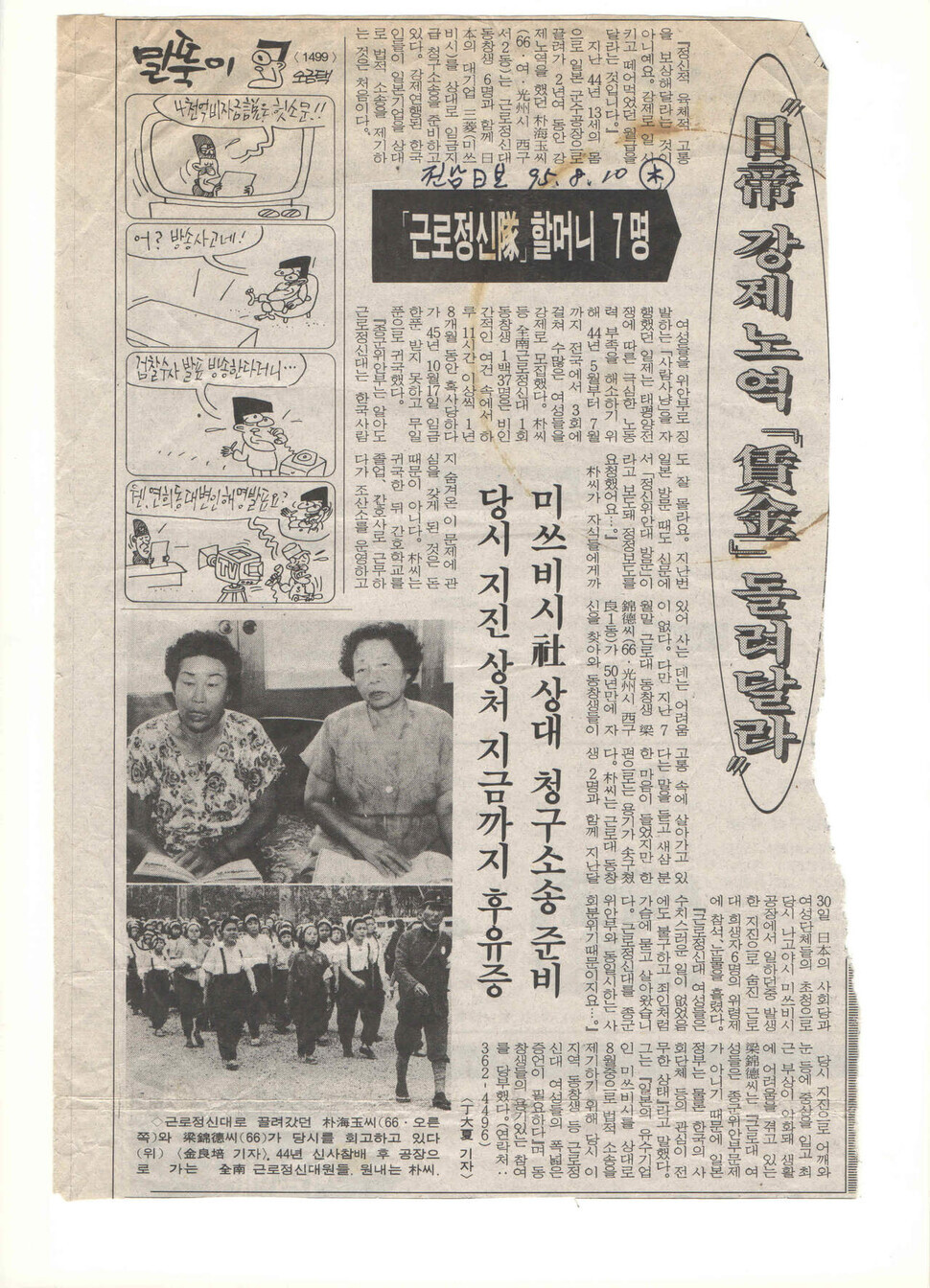hankyoreh
Links to other country sites 다른 나라 사이트 링크
Park Hae-ok, who sought to hold Mitsubishi Heavy accountable for war crimes, dies at 91

Park Hae-ok, one of the first women to come forward as a victim of forced child labor as part of the Korean Women's Volunteer Labor Corps drafted by Japan during WWII, has died. She passed at the age of 91 without having received an apology from Japan.
The Citizens’ Forum for Halmuni, a civic organization advocating for victims of forced labor by Japan, released a statement Thursday saying that Park had passed away on Wednesday evening from a chronic illness. In its statement, the forum called her, “Park Halmoni” or “Grandmother Park,” and noted her “long fight that started over 20 years ago in Japan.”
With Park’s passing, only two of the five plaintiffs in the lawsuit against Mitsubishi Heavy Industries for war crimes, which was won at the South Korean Supreme Court in 2018, remain alive. Their names are Yang Geum-deok and Kim Seong-ju.
Born in Suncheon, South Jeolla Province, in late May of 1944, Park was sent to a Mitsubishi Heavy Industries aircraft factory in Nagoya following her graduation from elementary school due to pressure from the school’s principal, who was Japanese.
“At first, I refused when the Japanese principal tried to coax me, but when he threatened that my parents would be arrested by the police if I didn’t, I had no choice but to say yes,” Park had previously said.
After enduring starvation and being forced into hard labor without receiving a penny in wages, she returned home after Korea was liberated in 1945.
Park first revealed the fact that she had been mobilized into the Korean Women's Volunteer Labor Corps for forced labor in an interview with a local newspaper in August 1995 with fellow victim Yang Geum-deok.

In 1991, the late Kim Hak-soon was the first former “comfort woman” to break the silence on the horrors of sexual slavery at the hands of Imperial Japan that countless women had endured. But, because of the social atmosphere surrounding sex crimes in Korea at the time, people often confused victims of the "comfort women" system and victims of the Korean Women's Volunteer Labor Corps as being one and the same.
Up until that time, Park had run a midwifery center in Gwangju and enjoyed a decent social life, but following her interview with the paper, she was subjected to ridicule.
Then, in March of 1999, Park filed a lawsuit against the Japanese government and Mitsubishi Heavy Industries in the Nagoya District Court, but ultimately lost the case in the Japanese Supreme Court on Nov. 11, 2008.
The following year, the Japanese government paid seven former members of the labor corps, including Park, 99 yen — about 1,000 Korean won, or US$1.00 — in pension payouts from their time performing forced labor.
Park filed a lawsuit against Mitsubishi Heavy Industries at the Gwangju District Court alongside four other victims on Oct. 24, 2012, and finally came out victorious in the Korean Supreme Court on Nov. 29, 2018. But Mitsubishi did not pay out compensation or apologize for more than three years following the verdict, a fact that outraged Park.
Park also filed for a seizure of two patent rights against Mitsubishi; the seizure was finalized at the Supreme Court on Dec. 27 of last year.
Park, who lived in Gwangju, went to a nursing hospital in Jeonju, where her children resided, due to health problems in the fall of 2019. At the time, she said, “I will return to Gwangju when I recover my health.” Ultimately, she was unable to fulfill that wish.
Although Park was a victim herself, she was particularly outraged at Japan for its use of forced child labor.
Lee Guk-eon, president of the Citizens’ Forum for Halmuni, said, “She always said that 'we must educate our students so that this shameful history is not forgotten. Mitsubishi must apologize and must pay the price for their sins.’ I want future generations to remember Grandmother Park's courage.”
Park is survived by two sons and two daughters. A wake will be held at the funeral hall of the Presbyterian Medical Center in Jeonju, with a funeral service scheduled for 9 am Friday.
By Kim Yong-hee, Gwangju correspondent
Please direct questions or comments to [english@hani.co.kr]

Editorial・opinion
![[Editorial] Penalties for airing allegations against Korea’s first lady endanger free press [Editorial] Penalties for airing allegations against Korea’s first lady endanger free press](https://flexible.img.hani.co.kr/flexible/normal/500/300/imgdb/original/2024/0502/1817146398095106.jpg) [Editorial] Penalties for airing allegations against Korea’s first lady endanger free press
[Editorial] Penalties for airing allegations against Korea’s first lady endanger free press![[Editorial] Yoon must halt procurement of SM-3 interceptor missiles [Editorial] Yoon must halt procurement of SM-3 interceptor missiles](https://flexible.img.hani.co.kr/flexible/normal/500/300/imgdb/child/2024/0501/17145495551605_1717145495195344.jpg) [Editorial] Yoon must halt procurement of SM-3 interceptor missiles
[Editorial] Yoon must halt procurement of SM-3 interceptor missiles- [Guest essay] Maybe Korea’s rapid population decline is an opportunity, not a crisis
- [Column] Can Yoon steer diplomacy with Russia, China back on track?
- [Column] Season 2 of special prosecutor probe may be coming to Korea soon
- [Column] Park Geun-hye déjà vu in Yoon Suk-yeol
- [Editorial] New weight of N. Korea’s nuclear threats makes dialogue all the more urgent
- [Guest essay] The real reason Korea’s new right wants to dub Rhee a founding father
- [Column] ‘Choson’: Is it time we start referring to N. Korea in its own terms?
- [Editorial] Japan’s rewriting of history with Korea has gone too far
Most viewed articles
- 160% of young Koreans see no need to have kids after marriage
- 2Months and months of overdue wages are pushing migrant workers in Korea into debt
- 3[Editorial] Penalties for airing allegations against Korea’s first lady endanger free press
- 4Historic court ruling recognizes Korean state culpability for massacre in Vietnam
- 5Presidential office warns of veto in response to opposition passing special counsel probe act
- 6[Reporter’s notebook] In Min’s world, she’s the artist — and NewJeans is her art
- 7Bills for Itaewon crush inquiry, special counsel probe into Marine’s death pass National Assembly
- 8In rejecting statute of limitations defense in massacre case, Korean court faces up to Vietnam War a
- 9[Guest essay] How Korea must answer for its crimes in Vietnam
- 10Story of massacre victim’s court victory could open minds of Vietnamese to Korea, says documentarian